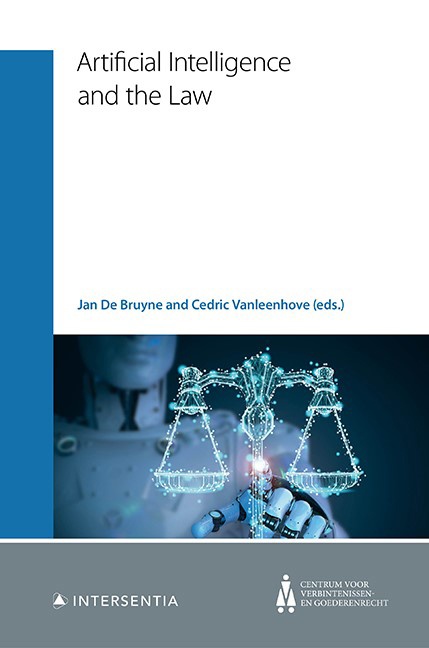Book contents
- Frontmatter
- Contents
- Foreword
- Contributing Authors
- Chapter 1 Basic Concepts of AI for Legal Scholars
- Chapter 2 Different Models of Innovation and Their Relation to Law
- Chapter 3 Setting the Scene: On AI Ethics and Regulation
- Chapter 4 Quantitative Legal Prediction: the Future of Dispute Resolution?
- Chapter 5 AI Arbitrators … ‘Does Not Compute’
- Chapter 6 AI through a Human Rights Lens. The Role of Human Rights in Fulfilling AI’s Potential
- Chapter 7 Killer Robots: Lethal Autonomous Weapons and International Law
- Chapter 8 AI and Data Protection: the Case of Smart Home Assistants
- Chapter 9 AI and IP: a Tale of Two Acronyms
- Chapter 10 Tax and Robots
- Chapter 11 Robotisation and Labour Law. The Dark Factory: the Dark Side of Work?
- Chapter 12 The Hypothesis of Technological Unemployment Caused by AI-Driven Automation and its Impact on Social Security Law
- Chapter 13 AI in Belgian Contract Law: Disruptive Challenge or Business as Usual?
- Chapter 14 Tort Law and Damage Caused by AI Systems
- Chapter 15 Insurance Underwriting on the Basis of Telematics: Segmentation and Profiling
- Chapter 16 AI and Creditworthiness Assessments: the Tale of Credit Scoring and Consumer Protection. A Story with a Happy Ending?
- Chapter 17 AI and the Consumer
- Chapter 18 Robots and AI in the Healthcare Sector: Potential Existing Legal Safeguards Against a(n) (Un)justified Fear for ‘Dehumanisation’ of the Physician-Patient Relationship
Chapter 4 - Quantitative Legal Prediction: the Future of Dispute Resolution?
Published online by Cambridge University Press: 26 May 2021
- Frontmatter
- Contents
- Foreword
- Contributing Authors
- Chapter 1 Basic Concepts of AI for Legal Scholars
- Chapter 2 Different Models of Innovation and Their Relation to Law
- Chapter 3 Setting the Scene: On AI Ethics and Regulation
- Chapter 4 Quantitative Legal Prediction: the Future of Dispute Resolution?
- Chapter 5 AI Arbitrators … ‘Does Not Compute’
- Chapter 6 AI through a Human Rights Lens. The Role of Human Rights in Fulfilling AI’s Potential
- Chapter 7 Killer Robots: Lethal Autonomous Weapons and International Law
- Chapter 8 AI and Data Protection: the Case of Smart Home Assistants
- Chapter 9 AI and IP: a Tale of Two Acronyms
- Chapter 10 Tax and Robots
- Chapter 11 Robotisation and Labour Law. The Dark Factory: the Dark Side of Work?
- Chapter 12 The Hypothesis of Technological Unemployment Caused by AI-Driven Automation and its Impact on Social Security Law
- Chapter 13 AI in Belgian Contract Law: Disruptive Challenge or Business as Usual?
- Chapter 14 Tort Law and Damage Caused by AI Systems
- Chapter 15 Insurance Underwriting on the Basis of Telematics: Segmentation and Profiling
- Chapter 16 AI and Creditworthiness Assessments: the Tale of Credit Scoring and Consumer Protection. A Story with a Happy Ending?
- Chapter 17 AI and the Consumer
- Chapter 18 Robots and AI in the Healthcare Sector: Potential Existing Legal Safeguards Against a(n) (Un)justified Fear for ‘Dehumanisation’ of the Physician-Patient Relationship
Summary
INTRODUCTION
1. Civil procedure is not an area of law known for its innovative disposition. The roots of civil procedural law for most of the European jurisdictions can be found in the Romano-canonical procedure and this common foundation has seen little profound change since.
This long history does not mean that civil procedure is insulated from innovation. On the contrary, its sometimes arcane and paper-driven methods and procedures leave much room for improvement, an endeavour in which recent changes such as the ‘Potpourri’ legislation in Belgium have only been incrementally successful. Perhaps a shock treatment is necessary for fundamental change within this area of law, and such a shock is what AI aspires to be.
2. Artificially intelligent civil procedure goes beyond the mere digitisation of procedure, promising rather a digitised justice in which the daily work of legal actors is to a large extent assisted by machines, changing the nature of judicial decision-making as we know it today. A thorough examination of the possible impact of AI on civil procedure would, at this point in time, largely amount to conjecture. Therefore, this chapter focuses on one phenomenon of which the shape is already discernible, even though successful applications within the area of civil procedure are still few and far between. This phenomenon is quantitative or algorithmic legal prediction (henceforth QLP), colloquially known as predictive justice. As a book chapter of limited length does not lend itself to an in-depth study of this phenomenon, this chapter will only scrape the surface of some topics. The interested reader will find more information in the referenced material. Even though this edited volume focuses on Belgium, this chapter will only briefly touch upon this jurisdiction given the general absence of Belgian initiatives in this field. Rather, the hurdles Belgium needs to overcome in order to facilitate the AI revolution in its civil procedure will be outlined in the final part of this chapter.
3. This chapter provides a brief introduction to legal analytics and quantitative legal prediction (part 2), followed by a short overview of some existing use cases of QLP (part 3). Potential use cases and their advantages are discussed (part 4), whilst the challenges that QLP poses are highlighted as well (part 5).
- Type
- Chapter
- Information
- Artificial Intelligence and the Law , pp. 73 - 100Publisher: IntersentiaPrint publication year: 2021
- 1
- Cited by



